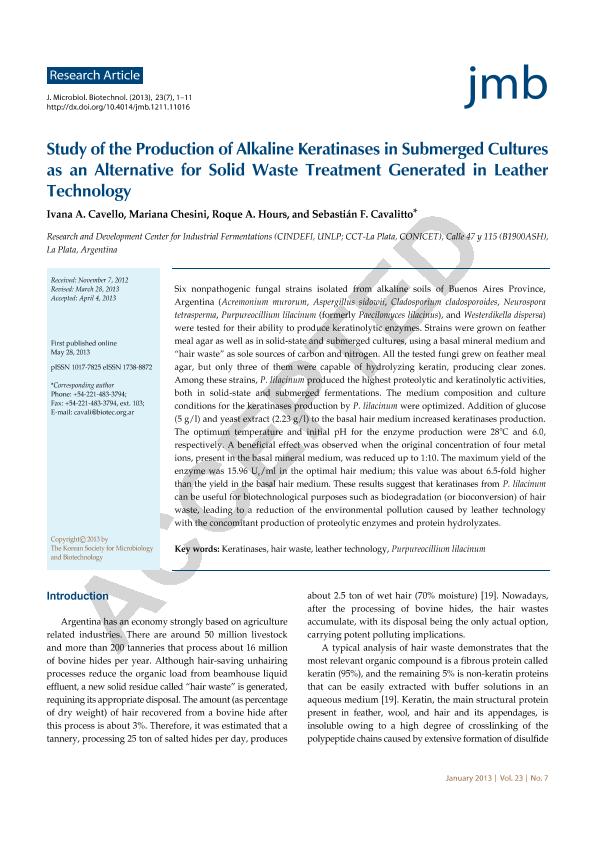Mostrar el registro sencillo del ítem
dc.contributor.author
Chesini, Mariana

dc.contributor.author
Cavello, Ivana Alejandra

dc.contributor.author
Hours, Roque Alberto

dc.contributor.author
Cavalitto, Sebastian Fernando

dc.date.available
2016-02-19T18:47:50Z
dc.date.issued
2013-07
dc.identifier.citation
Chesini, Mariana; Cavello, Ivana Alejandra; Hours, Roque Alberto; Cavalitto, Sebastian Fernando; Study of the production of alkaline keratinases in submerged cultures as an alternative for solid waste treatment generated in leather technology; Korean Society Microbiology & Biotechnology; Journal of Microbiology and Biotechnology; 23; 7; 7-2013; 982-992
dc.identifier.issn
1017-7825
dc.identifier.uri
http://hdl.handle.net/11336/4323
dc.description.abstract
Six nonpathogenic fungal strains isolated from alkaline soils of Buenos Aires Province, Argentina (Acremonium murorum, Aspergillus sidowii, Cladosporium cladosporoides, Neurospora tetrasperma, Purpureocillium lilacinum (formerly Paecilomyces lilacinus), and Westerdikella dispersa) were tested for their ability to produce keratinolytic enzymes. Strains were grown on feather meal agar as well as in solid-state and submerged cultures, using a basal mineral medium and “hair waste” as sole sources of carbon and nitrogen. All the tested fungi grew on feather meal agar, but only three of them were capable of hydrolyzing keratin, producing clear zones. Among these strains, P. lilacinum produced the highest proteolytic and keratinolytic activities, both in solid-state and submerged fermentations. The medium composition and culture conditions for the keratinases production by P. lilacinum were optimized. Addition of glucose (5 g/l) and yeast extract (2.23 g/l) to the basal hair medium increased keratinases production. The optimum temperature and initial pH for the enzyme production were 28o C and 6.0, respectively. A beneficial effect was observed when the original concentration of four metal ions, present in the basal mineral medium, was reduced up to 1:10. The maximum yield of the enzyme was 15.96 Uc/ml in the optimal hair medium; this value was about 6.5-fold higher than the yield in the basal hair medium. These results suggest that keratinases from P. lilacinum can be useful for biotechnological purposes such as biodegradation (or bioconversion) of hair waste, leading to a reduction of the environmental pollution caused by leather technology with the concomitant production of proteolytic enzymes and protein hydrolyzates
dc.format
application/pdf
dc.language.iso
eng
dc.publisher
Korean Society Microbiology & Biotechnology

dc.rights
info:eu-repo/semantics/openAccess
dc.rights.uri
https://creativecommons.org/licenses/by-nc-sa/2.5/ar/
dc.subject
Keratinases
dc.subject
Hair Waste
dc.subject
Leather Technology
dc.subject
Purpureocillium Lilacinum
dc.subject.classification
Biotecnología Medioambiental

dc.subject.classification
Biotecnología del Medio Ambiente

dc.subject.classification
INGENIERÍAS Y TECNOLOGÍAS

dc.title
Study of the production of alkaline keratinases in submerged cultures as an alternative for solid waste treatment generated in leather technology
dc.type
info:eu-repo/semantics/article
dc.type
info:ar-repo/semantics/artículo
dc.type
info:eu-repo/semantics/publishedVersion
dc.date.updated
2016-03-30 10:35:44.97925-03
dc.journal.volume
23
dc.journal.number
7
dc.journal.pagination
982-992
dc.journal.pais
Corea del Sur

dc.journal.ciudad
Seul
dc.description.fil
Fil: Chesini, Mariana. Consejo Nacional de Investigaciones Científicas y Técnicas. Centro Científico Tecnológico la Plata. Centro de Investigación y Desarrollo En Fermentaciones Industriales (i); Argentina
dc.description.fil
Fil: Cavello, Ivana Alejandra. Consejo Nacional de Investigaciones Científicas y Técnicas. Centro Científico Tecnológico la Plata. Centro de Investigación y Desarrollo En Fermentaciones Industriales (i); Argentina
dc.description.fil
Fil: Hours, Roque Alberto. Consejo Nacional de Investigaciones Científicas y Técnicas. Centro Científico Tecnológico la Plata. Centro de Investigación y Desarrollo En Fermentaciones Industriales (i); Argentina
dc.description.fil
Fil: Cavalitto, Sebastian Fernando. Consejo Nacional de Investigaciones Científicas y Técnicas. Centro Científico Tecnológico la Plata. Centro de Investigación y Desarrollo En Fermentaciones Industriales (i); Argentina
dc.journal.title
Journal of Microbiology and Biotechnology

dc.relation.alternativeid
info:eu-repo/semantics/altIdentifier/url/https://www.jmb.or.kr/journal/view.html?volume=23&number=7&spage=1004
Archivos asociados
